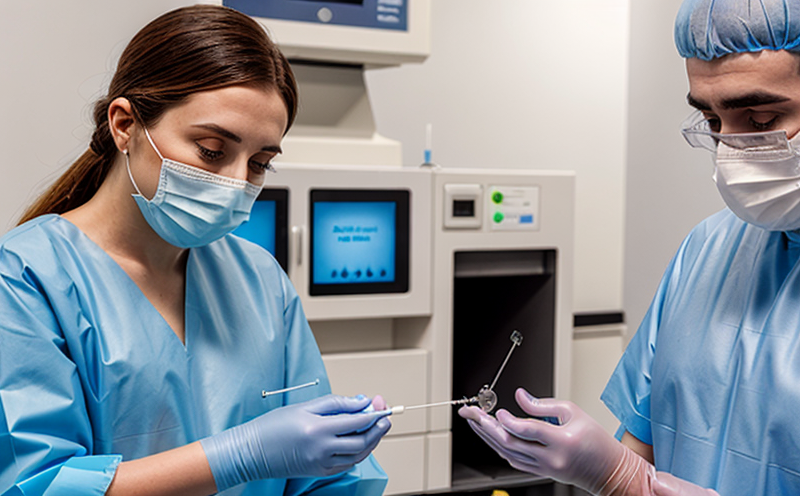
-
Healthcare and Medical Devices-
Biocompatibility Testing-
Biocompatibility Testing for Surgical Implants
We provide comprehensive solutions designed to help our clients mitigate risks, enhance performance, and excel in key areas such as quality, health & safety, environmental sustainability, and social responsibility.
Discover
For many years, our organization has been operating successfully, boasting modern laboratories that meet international standards. These laboratories are equipped with the latest technology devices and equipment, and we have built a strong team of experienced and trained personnel to operate them.
DiscoverWelcome to Eurolab, your partner in pioneering solutions that encompass every facet of life. We are committed to delivering comprehensive Assurance, Testing, Inspection, and Certification services, empowering our global clientele with the ultimate confidence in their products and processes.
Discover
-
Healthcare and Medical Devices-
Biocompatibility Testing-
Biocompatibility Testing for Surgical ImplantsBiocompatibility Testing for Surgical Implants: Ensuring Safety and Efficacy
Surgical implants have revolutionized healthcare by allowing patients to regain function and mobility after injury or disease. However, with the increased use of these devices comes a growing concern about their safety and compatibility with human tissue. Biocompatibility testing is essential to ensure that surgical implants do not cause adverse reactions, such as inflammation, corrosion, or allergic responses, which can lead to implant failure, patient discomfort, and even serious health complications.
Biocompatibility testing involves evaluating the interaction between an implant material and the surrounding biological environment. This includes assessing the chemical, physical, and biological properties of the implant to determine its potential for adverse reactions. The primary goal of biocompatibility testing is to identify any hazards associated with the use of surgical implants and to provide evidence that they meet regulatory requirements.
Regulatory Framework
The regulatory framework governing biocompatibility testing for surgical implants varies across countries. However, most major regulatory agencies, including the US FDA (Food and Drug Administration), European Commission, and International Organization for Standardization (ISO), have established guidelines for biocompatibility testing. These guidelines specify the types of tests to be conducted, the materials to be tested, and the acceptable limits for various parameters.
In the United States, the FDA requires manufacturers to conduct biocompatibility testing on all implantable devices, including surgical implants, before they can be marketed. The FDAs guidance document Use of International Standard ISO 10993-1:2009 (Mod) for Biological Evaluation of Medical Devices provides detailed information on the requirements for biocompatibility testing.
Biological Evaluation
The biological evaluation of a surgical implant involves assessing its potential to cause adverse reactions in humans. This includes evaluating the materials chemical and physical properties, as well as its interaction with the surrounding tissue. The following are some key aspects of biological evaluation:

Electrical and Electromagnetic Testing
Electrical and Electromagnetic Testing: A Comprehensive Guide Introduction Electrical and electrom...

Automotive Compliance and Certification
Automotive Compliance and Certification: Ensuring Safety and Efficiency The automotive industry is ...

Industrial Equipment Certification
Industrial equipment certification is a critical process that ensures industrial equipment meets spe...

Environmental Simulation Testing
Environmental Simulation Testing: A Comprehensive Guide In todays world, where technology is rapidl...

Battery Testing and Safety
Battery Testing and Safety: A Comprehensive Guide As technology continues to advance, battery-power...

Transportation and Logistics Certification
Transportation and Logistics Certification: A Comprehensive Guide The transportation and logistics ...

Trade and Government Regulations
Trade and government regulations play a vital role in shaping the global economy. These regulations ...

Environmental Impact Assessment
Environmental Impact Assessment: A Comprehensive Guide Environmental Impact Assessment (EIA) is a c...

Healthcare and Medical Devices
The Evolution of Healthcare and Medical Devices: Trends, Innovations, and Challenges The healthcare...

Fire Safety and Prevention Standards
Fire Safety and Prevention Standards: Protecting Lives and Property Fire safety and prevention stan...

Aviation and Aerospace Testing
Aviation and Aerospace Testing: Ensuring Safety and Efficiency The aviation and aerospace industr...

NEBS and Telecommunication Standards
Network Equipment Building System (NEBS) and Telecommunication Standards The Network Equipment Bu...

Pressure Vessels and Installations Testing
Pressure Vessels and Installations Testing Pressure vessels are a critical component of various ind...

IT and Data Center Certification
IT and Data Center Certification: Understanding the Importance and Benefits The field of Informatio...

Hospitality and Tourism Certification
Hospitality and Tourism Certification: Unlocking Opportunities in the Industry The hospitality and ...

Lighting and Optical Device Testing
Lighting and Optical Device Testing: Ensuring Performance and Safety Lighting and optical devices a...

Railway Industry Compliance
Railway Industry Compliance: Ensuring Safety and Efficiency The railway industry is a critical comp...

Renewable Energy Testing and Standards
Renewable Energy Testing and Standards: Ensuring a Sustainable Future The world is rapidly transiti...

Cosmetic Product Testing
The Complex World of Cosmetic Product Testing The cosmetics industry is a multi-billion-dollar ma...

Energy and Sustainability Standards
In today’s rapidly evolving world, businesses face increasing pressure to meet global energy a...

Construction and Engineering Compliance
Construction and Engineering Compliance: Ensuring Safety, Quality, and Regulatory Adherence In the ...

Food Safety and Testing
Food Safety and Testing: Ensuring the Quality of Our Food As consumers, we expect our food to be sa...

Electromechanical Safety Certification
Electromechanical Safety Certification: Ensuring Compliance and Protecting Lives In todays intercon...

Chemical Safety and Certification
Chemical safety and certification are critical in ensuring the safe management of products and proce...

Agricultural Equipment Certification
Agricultural equipment certification is a process that ensures agricultural machinery meets specific...

Military Equipment Standards
Military Equipment Standards: Ensuring Effectiveness and Safety The use of military equipment is a ...

Product and Retail Standards
Product and Retail Standards: Ensuring Quality and Safety for Consumers In todays competitive marke...

Pharmaceutical Compliance
Pharmaceutical compliance refers to the adherence of pharmaceutical companies and organizations to l...

Consumer Product Safety
Consumer Product Safety: Protecting Consumers from Harmful Products As a consumer, you have the rig...

MDR Testing and Compliance
MDR Testing and Compliance: A Comprehensive Guide The Medical Device Regulation (MDR) is a comprehe...